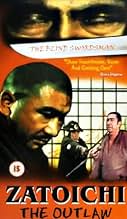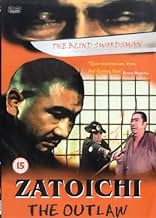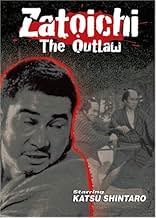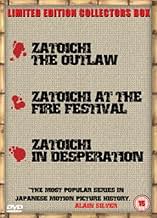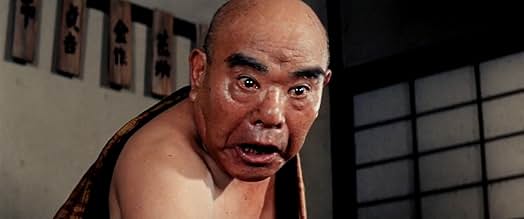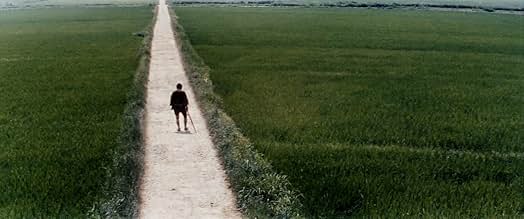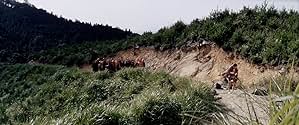IMDb RATING
7.0/10
1.4K
YOUR RATING
In a town where debt-ridden peasants are being ruthlessly exploited, Zatoichi is forced to take sides between a cruel yakuza boss and his seemingly altruistic rival.In a town where debt-ridden peasants are being ruthlessly exploited, Zatoichi is forced to take sides between a cruel yakuza boss and his seemingly altruistic rival.In a town where debt-ridden peasants are being ruthlessly exploited, Zatoichi is forced to take sides between a cruel yakuza boss and his seemingly altruistic rival.
Kô Nishimura
- Kyûshiro Suga
- (as Akira Nishimura)
Yûko Hamada
- Oshino
- (as Yuko Hamada)
Featured reviews
Zatoichi the Outlaw is the sixteenth entry in the franchise about the blind masseur, skilled swordsman and lowly yakuza. It's also the first film to be produced by Katsu Productions, lead actor's Katsu Shintaro's own company. The movie remains faithful to the franchise's typical storytelling of the main character traveling across rural Japan during the shogunate's final years in mid-nineteenth century in order to support the helpless in their struggles with exploitative authorities. However, there are also a few new elements such as more explicit fight scenes with severed limbs and fake blood. The plot is also more complex and epic than usual. To keep it short, Zatoichi travels to a town led by a sword-less ronin who leads a peasant movement advocating the abstention from drinking, gambling and whoring and teaching how to cultivate rice more efficiently. This ronin is supported by a seemingly honest yakuza and boss who appears to be very close to local farmers. However, another boss who is backed up by a corrupt government official has interest in making money as he organizes a festival promoting the use of alcohol, indepts young peasants by making them participate in crooked gambling and establishes a new brothel. Zatoichi gets caught in between the opposing parties and decides to help the sword-less ronin and the honest yakuza boss. He accidentally kills a peasant that was sent to attack him and injures another. When the corrupt boss confronts him, Zatoichi kills him and goes into hiding. However, Zatoichi soon realizes that his actions have changed things for the worse. The dead peasant's sister is abused by the corrupt government official and then forced into prostitution. The injured peasant is obsessed with killing Zatoichi. The honest yakuza has taken the dead boss' place and has been corrupted by greed and power. The sword-less ronin gets is accused of treason and gets imprisoned. One year after he left the village, Zatoichi is back to repair his mistakes by using his sword.
Even though several critics had a negative perception of Zatoichi the Outlaw, I happen to think it's one of the best entries in the franchise. First of all, the camera work is splendid. It's calm, focused and precise and the landscapes are even more colorful than usual. The score is dramatic and adds a solid dose of intensity to the film. The numerous characters are intriguing and have depth, especially since a lot of them are going through profound and at times unpredictable changes. The movie also has a more ideologiocal and philosophical note as the sword-less ronin tries to organize collective farming and suggest Zatoichi to lay down his sword. This movie almost has a socialist message which is quite interesting. The fight sequences are more intense as well thanks to more explicit scenes with torn hands and heads and the use of fake blood. It makes the brief fights more realistic.
However, the film has a few minor flaws. Even though new writers and even a new director were hired for this film, the plot is still mostly predictable. Also, there aren't many sword fights and the few that are shown aren't as skillful as one is used to. The fights are more brutal and realistic but less artistic and dynamic, taking away from the charme of the series.
In the end, Zatoichi the Outlaw is still a highlight of the Zatoichi franchise in my book. The great acting performances, progressive ideologies and epic plot make this film stand out for fans of old date and new ones alike. Ignore the negative reviews and give it a try!
Even though several critics had a negative perception of Zatoichi the Outlaw, I happen to think it's one of the best entries in the franchise. First of all, the camera work is splendid. It's calm, focused and precise and the landscapes are even more colorful than usual. The score is dramatic and adds a solid dose of intensity to the film. The numerous characters are intriguing and have depth, especially since a lot of them are going through profound and at times unpredictable changes. The movie also has a more ideologiocal and philosophical note as the sword-less ronin tries to organize collective farming and suggest Zatoichi to lay down his sword. This movie almost has a socialist message which is quite interesting. The fight sequences are more intense as well thanks to more explicit scenes with torn hands and heads and the use of fake blood. It makes the brief fights more realistic.
However, the film has a few minor flaws. Even though new writers and even a new director were hired for this film, the plot is still mostly predictable. Also, there aren't many sword fights and the few that are shown aren't as skillful as one is used to. The fights are more brutal and realistic but less artistic and dynamic, taking away from the charme of the series.
In the end, Zatoichi the Outlaw is still a highlight of the Zatoichi franchise in my book. The great acting performances, progressive ideologies and epic plot make this film stand out for fans of old date and new ones alike. Ignore the negative reviews and give it a try!
The whole series is impressive. Yet this is way lower in quality. As another reviewer compared it with the Tarantino junk, well, for those there isn't any drop in quality.
I'd say it's impressive to keep such a long series till the first movie of a lesser value. This is the first one with a complicated to shady story line and at this point they try (why?) to experiment with a different kind of cinematography. And while the dynamic scenes are a bit weird, things like the beheading are way out of their league... It's more inexplicable as the series so far was good enough skipping gore and close-ups.
Also, there is no need to relate this series with Kurosawa. Kurosawa, a samurai descendant, made movies about the life and honor of the important people. People who went for the art and not for the craft. Zatoichi is made by actor descendants (quite at the opposite side of the social scale) and it's about life and death and less about the craft. One is telling the stories from above the peasant class, in a contemplative manner and the other is telling them from the back streets somehow looking up to the stability of the peasant life.
Contact me with Questions, Comments or Suggestions ryitfork @ bitmail.ch
I'd say it's impressive to keep such a long series till the first movie of a lesser value. This is the first one with a complicated to shady story line and at this point they try (why?) to experiment with a different kind of cinematography. And while the dynamic scenes are a bit weird, things like the beheading are way out of their league... It's more inexplicable as the series so far was good enough skipping gore and close-ups.
Also, there is no need to relate this series with Kurosawa. Kurosawa, a samurai descendant, made movies about the life and honor of the important people. People who went for the art and not for the craft. Zatoichi is made by actor descendants (quite at the opposite side of the social scale) and it's about life and death and less about the craft. One is telling the stories from above the peasant class, in a contemplative manner and the other is telling them from the back streets somehow looking up to the stability of the peasant life.
Contact me with Questions, Comments or Suggestions ryitfork @ bitmail.ch
So far I have watched all 15 of the Zatoichi movies preceding Zatoichi the Outlaw and this title surprised me the most. Zatoich the Outlaw still uses the 'tried and tested' formula of a typical Zatoichi movie with a few subtle changes that gives this film a fresh take on the franchise.
This is largely thanks to the fact that this is the first film done by the Katsu Production Co. The few subtle changes I referred to was firstly brought on by the use of plot devices such as the flow of time to help demonstrate how the true nature of man can change with time.
Secondly, the movie gives a short glimpse of Zatoichis' life as a masseur in a mountain-side village. This part of the movie was my favorite part as it depicts Zatoichi as a lone drifter that tries to fit in a village of people that recognizes him as someone special, an outsider. His dealings with fellow blind massuers'(anma); rich-folk and a beautiful girl sums him up nicely as an individual in these few short scenes.
This film also didn't shy away when it came to violence. Severed limbs and blood abound demonstrates Zatoichis' deadly swordmanship. In many of the previous films it felt like he was merely hitting his opponents with a stick as there was hardly any evidence of fatal injuries and such.
The cinematography is top-notch,the Katsu Production Co. went all out: Picturesque Japanese landscapes; tons of extras dressed up in the appropriate period attire and vibrant colors never before seen in a Zatoichi film. The actors did a stellar job, Rentarô Mikuni that played Asagoro deserves special credit for his truly versatile ability to depicts both sides of human cruelty. The Katsu Production Co. obviously avoided using the same actors that circulated through the series,some actors have played as 5 different characters in the previous films! I was quite surprised when I saw some of the IMDb user reviews writing the film up as the first let down in the long-running series. To the contrary, this film in my opinion is one of the best so far.
This is largely thanks to the fact that this is the first film done by the Katsu Production Co. The few subtle changes I referred to was firstly brought on by the use of plot devices such as the flow of time to help demonstrate how the true nature of man can change with time.
Secondly, the movie gives a short glimpse of Zatoichis' life as a masseur in a mountain-side village. This part of the movie was my favorite part as it depicts Zatoichi as a lone drifter that tries to fit in a village of people that recognizes him as someone special, an outsider. His dealings with fellow blind massuers'(anma); rich-folk and a beautiful girl sums him up nicely as an individual in these few short scenes.
This film also didn't shy away when it came to violence. Severed limbs and blood abound demonstrates Zatoichis' deadly swordmanship. In many of the previous films it felt like he was merely hitting his opponents with a stick as there was hardly any evidence of fatal injuries and such.
The cinematography is top-notch,the Katsu Production Co. went all out: Picturesque Japanese landscapes; tons of extras dressed up in the appropriate period attire and vibrant colors never before seen in a Zatoichi film. The actors did a stellar job, Rentarô Mikuni that played Asagoro deserves special credit for his truly versatile ability to depicts both sides of human cruelty. The Katsu Production Co. obviously avoided using the same actors that circulated through the series,some actors have played as 5 different characters in the previous films! I was quite surprised when I saw some of the IMDb user reviews writing the film up as the first let down in the long-running series. To the contrary, this film in my opinion is one of the best so far.
If this had been done earlier in the Zatoichi series it could have been one of the best. It is good enough, as most of them are, but the plot and the characters seem too complicated for the series at this point. The situation is unusually intriguing: the farmers in the province have two champions, a benevolent boss (for once) and a philosopher-samurai who starts a sort of Grange; both run afoul of the usual local gangsters, who want the crops to fail because it increases their gambling revenues and their chances to snap up some land; their chief or powerful ally is a seeming puritan who is death on drinking and gambling but secretly indulges his own perverse appetites. (He also resembles Dracula, as the villains in the later Zatoichi movies tend increasingly to do.) These characters have enough meaning so that they deserved to be set against Zatoichi as he was drawn originally, but by now he has lost many of his nuances, and the changes in some of the characters, such as the good boss and the angry sister of a man Zatoichi has killed, need more time then the movie has to give, so that the story seems choppy, as if some scenes were missing. Other than that, the movie shows the virtues of most of the others in the series: good acting, sometimes lyrical photography, the creation of a vivid, believable, and uniquely recognizable landscape (the absence of which is obvious in the occasional episode where the director just misses it), and a technical quality that of its nature disguises itself: the imaginatively varied use of limited sets so their limitations seem not to exist. And of course there is the keynote actor, whose presence, as much as his performance, makes it all work. This must be one of the best-sustained series in movie history.
I agree with most if not all of the previous commenter's Tom (bighouseaz@yahoo.com). The Zatoichi series is a great character study combined with great sword fighting and excitement.
I have seen Zatoichi 1-13,15,16; I believe 14 has not been released on Zone 1 (usa). Zatoichi the Outlaw was disappointing. The story line was complicated, and seemed to be a hodgepodge of many previous Zatoichi story lines. At one point, I was wondering if I was not seeing a remake of a previous Zatoichi film.
This film was disappointing because it started to depend on effects (a head rolling, limbs severed, blood) and less on the nobility of the Zatoichi character. All the previous films succeeded based on the storyline and action, and won a great following without having to resort to effects.
I am just hoping that the remaining Zatoichi films do NOT follow the same trend. This is the first Zatoichi film from his studio. I highly recommend all the previous Zatoichi films -- and recommend them.
I have seen Zatoichi 1-13,15,16; I believe 14 has not been released on Zone 1 (usa). Zatoichi the Outlaw was disappointing. The story line was complicated, and seemed to be a hodgepodge of many previous Zatoichi story lines. At one point, I was wondering if I was not seeing a remake of a previous Zatoichi film.
This film was disappointing because it started to depend on effects (a head rolling, limbs severed, blood) and less on the nobility of the Zatoichi character. All the previous films succeeded based on the storyline and action, and won a great following without having to resort to effects.
I am just hoping that the remaining Zatoichi films do NOT follow the same trend. This is the first Zatoichi film from his studio. I highly recommend all the previous Zatoichi films -- and recommend them.
Did you know
- TriviaThe first Zatôichi film produced by Katsu Productions (Shintarô Katsu's own company).
- ConnectionsFollowed by La Légende de Zatoïchi : Route sanglante (1967)
- How long is Zatoichi the Outlaw?Powered by Alexa
Details
- Release date
- Country of origin
- Language
- Also known as
- Le justicier
- Production companies
- See more company credits at IMDbPro
- Runtime1 hour 36 minutes
- Aspect ratio
- 2.35 : 1
Contribute to this page
Suggest an edit or add missing content


